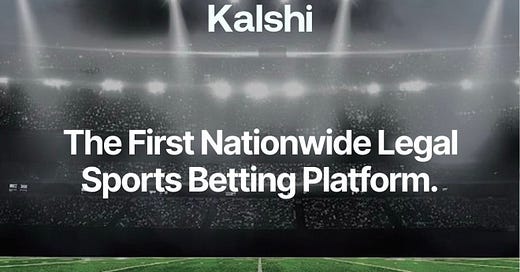The Battle For The Future Of Sports Prediction Markets Begins
Kalshi lawsuits filed in Nevada and New Jersey last night are a pivotal moment for the future of nationwide sports betting
You might say everything that’s happened in the chaos around sports betting via prediction markets was just an appetizer for what’s still to come.
Last night, Kalshi filed lawsuits in Nevada and New Jersey in response to cease-and-desist orders in both of those states for allegedly offering sports betting illegally. More on the lawsuits at my other newsletter, The Event Horizon.
Kalshi offered this statement from CEO Tarek Mansour this morning.
“We have been targeted before, we have fought before, and we have won before. This time will be no different.
The threatened actions in Nevada and New Jersey seek to undermine not just Kalshi’s contracts, but the authority granted by Congress to the Commodity Futures Trading Commission, which has safely and effectively governed commodities markets for decades.
Prediction markets are a critical innovation of the 21st century, and like all innovations, they are initially misunderstood. We are proud to be the company that has pioneered this technology and stand ready to defend it once again in a court of law.”
New Jersey upped the ante Thursday as the second state to tell Kalshi to stop offering peer-to-peer sports betting. The result: We now have two federal court cases that could shape the contours of what’s to come for prediction markets.
Kalshi has a chance to prove and codify what it’s maintained all along: that federal law preempts the states in this instance, and that its status as a federally regulated exchange under the CFTC is all that matters.
Will the courts agree with Kalshi that they should be able to continue to operate in these states while the case is heard? Or will “sports betting in all 50 states” quickly become less than 50 states?
Meanwhile, we still have the CFTC and Kalshi involved in another federal case about the legality of election betting.
We’re probably not done with legal wrangling either at the state or federal level.
Tribes believe that there is a conflict with the Indian Gaming Regulatory Act; there are also arguments that sports event trading runs afoul of other federal laws.
There is already a report that Washington state regulators are looking at Kalshi; Massachusetts has a securities investigation into Robinhood; and Michigan, perhaps the most aggressive regulator on unregulated gambling, has not yet weighed in.
I don’t think Kalshi thought everyone would roll out the red carpet for them when they started offering sports betting. Now they get to see if their “bull in a china shop” approach worked.





